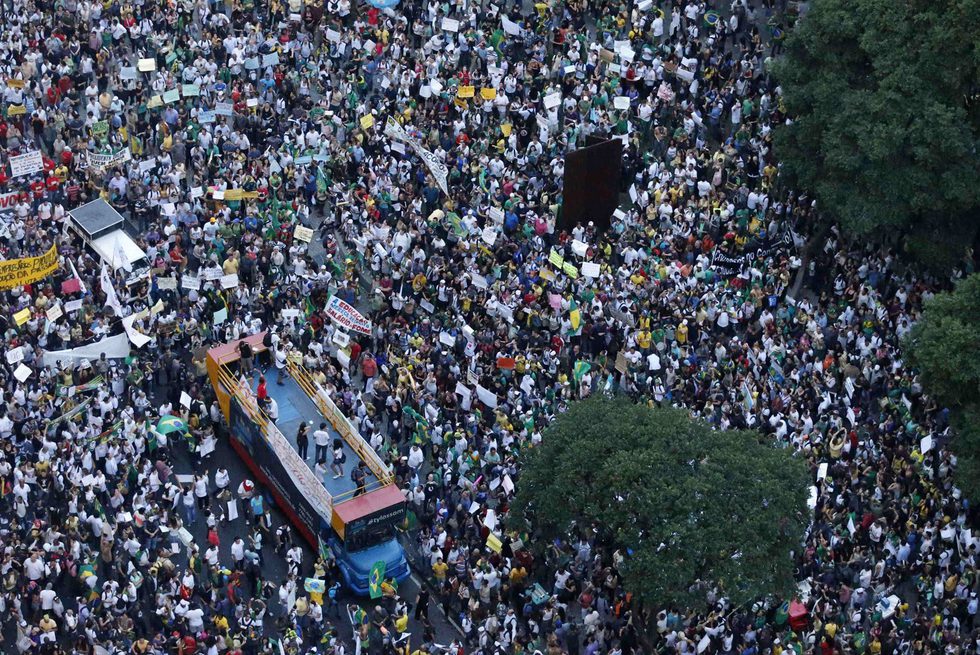The "Vandal" and the Warrior Policeman: The Difficult Relation between Directed Social Changes and Conflicts Management Strategies
From the Series: Protesting Democracy in Brazil
From the Series: Protesting Democracy in Brazil

During the last decade, Brazil has joined a selective group of developing countries known as the emergent countries. It has been internationally perceived as a social and economic global player, and the country has attracted investments of significant capital. Consequently, it has become a part of the imaginary of tourists and entrepreneurs from several regions of the world. If Brazil seems to be so prosperous and inclusive, how can we understand the multiple and radical manifestations emerging in the country, such as the protests in June 2013? How can we understand the institutional reaction coming from police forces, which have made evident the phenomenon of the state violence?
It was not a coincidence that such mobilizations emerged in the beginning of the Confederations Cup—an event organized by the Federation of International Association of Soccer (FIFA), part of a series of mega-events to happen in Brazil (Olympics, Soccer World Cup, etc.). In previous months, prior to the Confederations Cup, different forms of commercial media anticipated the positive effects that investments in such events would have. This was part of the information spread by the government about subsidized private initiatives involving sums of money up to US$30 million. During this period, it was possible to observe a change in the scenario of prices in consumption: the threat of inflation was becoming a reality again. Here and there, accusations were heard about the misuse of public funds in the constructions. In addition, authoritarian initiatives from the state have emerged, such as the spatial relocation of people in order to contribute with the required planning to host the mega events. These public works generated chaos in city traffic, affecting the daily life of many people. Cities like São Paulo and Rio de Janeiro, centers of the two largest metropolitan areas in the country, became harsh to the daily circulation of people. The feeling of being stuck in time and space had gained dramatic consequences. In this context, the increase of the bus fares had been considered the "limit" that could generate a potentially explosive situation.
Brazil has always had difficulties organizing their domestic institutions. Its main institutions responsible for managing conflicts were created and developed during periods when the country was a colony of Portugal and, since the independence in 1822, when it was part of a decadent “semi-monarchical” empire. Brazilian people suffered a long period of unequal laws, connected to the slave model, which embedded the economy until 1888. Thus, much of the population was subordinate to criminal law and not subordinate to equitable civil rights. The Republican regime, created in 1889, did not change this dynamic. Until now, this biased law created several advantages in criminal and administrative proceedings for certain social segments, like some members of the government, that seem to have rights for irregular procedures, which results in them being considered unequal before the law.
Presently, the emergence of the so-called “new middle class” creates a favourable environment for this uneven balance of justice, once completely neutralized, to now become explicit in the public space. However, the traditional mechanisms of conflict management by coercive institutions (police, justice, and so on) do not identify in these emergent classes the same aesthetic patterns in order to elevate them to the level of a “medium” social stratification. As a consequence of this uneven rights environment, two kinds of conflicts were forecasted: those people who are subject to the same rights, which should be administrated by institutionally-constituted processes of discussion; and those people who are subject to unequal rights.
The conflicts used to be treated in an uneven way according to the differentiated segments of the population that had been involved in them. The poorer segments of the population (in social status as well as in rights) that manifests its presence in the public space in support of their social rights were specially treated in a repressive way. The coercive institutions, in their different dimensions (federal, state, and municipal), immediately identified the manifestations as a threat to the public order. The result was thus repressive action against them.
As a consequence, the Brazilian media corporations had represented the public demonstrations and marches as an expression of uncontrolled turmoil. Such representations are in jeopardy when other ways of interpreting this conjuncture are suggested. The transformation of the main Brazilian cities—Rio de Janeiro ahead of the other cities—made them objects of attention by the media, which has started to look at the relation between civil rights and political manifestations in a different way. This is absolutely legitimate in a Republic, and specifically in a democratic regime governed by a partnership coalition coordinated by one popular party.
Facing its discrepancies in reference to other corporations that dispute the attention of a distinctive public in times of globalization, the local means of commercial media forced itself to strategically step backwards. The media created a new actor to be criticized: the so-called "vandal," who would be understood as an individual originated from unattended needs. Such individuals would be represented as destroying both public and private patrimony, hence demanding repressive actions, specifically from the Brazilian military police. It contrasts with the hierarchic and complimentary harmony of the uneven legal environment, as the qualified principal of the protests, removing the legitimacy of its eventual excess of violence, actually being considerably forecast in the conjuncture of spontaneity in which they had occurred.
The recent public manifestations in Brazil unveil the paradoxes of liberal-capitalist societies: wherever the market produces inequality, the law must produce equality. Now we must know if our legal political traditions—once attached to the legal privileges of rigidly hierarchical societies —will prevail over the impact of internationalization, which is inevitable with the commoditization of the main Brazilian cities being administrated by their governors and businessman.